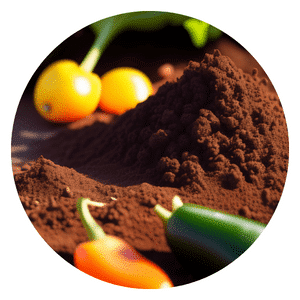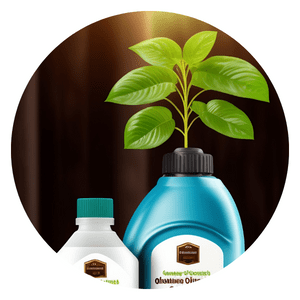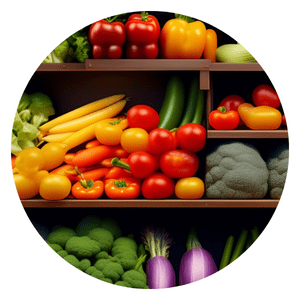Organic fertilizer for leafy vegetables
Are your leafy greens lacking that vibrant, healthy glow? It might be time to rethink your fertilizer game.
With countless options on the market, choosing the right organic fertilizer for your leafy greens can feel like navigating a maze.
But fear not! In this article, we will unlock the secrets to selecting the perfect organic fertilizer that will have your greens flourishing in no time.
Whether you’re a seasoned gardener or just starting out, get ready to dive deep into the world of organic fertilizers and discover how they can revolutionize your leafy green game.

Leafy Vegetables Fertilizer Menu
Understand Nutrient Needs
Understanding the nutrient needs of different vegetables is crucial when it comes to using organic fertilizers.
For leafy greens like spinach, lettuce, and kale, nitrogen (N) is the primary nutrient they require for optimal growth. Nitrogen plays a key role in promoting leaf development and overall plant vigor.
Providing an adequate amount of nitrogen ensures that these leafy vegetables can grow quickly and produce vibrant green leaves that are packed with essential vitamins and minerals.
However, it’s important to find the right balance when applying organic fertilizer to leafy greens.
While nitrogen is essential for their growth, an excessive amount can lead to rapid but weak growth and increased susceptibility to diseases and pests. It’s crucial to understand that more isn’t always better when it comes to fertilizing leafy vegetables.
Organic fertilizers rich in nitrogen should be applied sparingly, following recommended guidelines from reputable sources or with guidance from an experienced gardener or horticulturist.
To optimize nutrient uptake in your leafy green garden, consider using a slow-release organic fertilizer that provides a steady supply of nutrients over time. This approach reduces the risk of over-fertilization while ensuring a consistent supply of nitrogen for healthy growth throughout the growing season.
Additionally, incorporating compost into the soil can help improve nutrient availability by enhancing soil structure and microbial activity.
Understanding the specific nutrient needs of your chosen leafy greens will contribute not only to their success but also your overall gardening experience as you witness your plants flourish with lush foliage that’s packed full of vital nutrients
Check the N-P-K Ratio
When it comes to organic fertilizers for leafy vegetables, checking the N-P-K ratio is essential. The N-P-K ratio on a fertilizer label indicates the percentage of nitrogen (N), phosphorus (P), and potassium (K) in the product.
Each of these nutrients plays a crucial role in the growth and development of plants.
For leafy greens like lettuce, spinach, and kale, it is important to look for a fertilizer with a higher nitrogen content. Nitrogen promotes healthy green foliage by stimulating the production of chlorophyll, which aids in photosynthesis. It also supports vigorous growth and helps prevent leaf yellowing or wilting.
On the other hand, phosphorus helps plants develop strong root systems and encourages flower and fruit formation. While this nutrient is important for overall plant health, leafy greens typically require less phosphorus compared to fruits or flowering plants.
Finally, potassium plays a role in various physiological processes within plants, including water regulation and disease resistance. It improves overall plant vigor and increases tolerance to environmental stressors such as drought or frost.
Understanding the N-P-K ratios and their significance for specific crops allows gardeners to make informed choices when selecting organic fertilizers for their leafy vegetables.
By providing these essential nutrients in proper proportions through an organic fertilizer that matches your crop’s requirements will help ensure robust growth, abundant harvests, and healthy leafy greens on your plate!
Organic Granular Fertilizers
Organic granular fertilizers are an excellent choice for boosting the growth of leafy vegetables. These fertilizers release nutrients slowly, ensuring a consistent supply over time.
By providing a steady stream of essential elements, organic granular fertilizers help leafy greens develop strong and healthy leaves, making them more resistant to diseases and pests.
When selecting an organic granular fertilizer for leafy vegetables, it’s important to find options that are specifically labeled for use with these types of plants. This ensures that the fertilizer contains the right blend of nutrients needed to support their growth.
Look for products that have a balanced NPK ratio (nitrogen, phosphorus, and potassium), as well as additional micronutrients like calcium and magnesium.
Using organic granular fertilizers has several advantages over other forms of fertilization. Firstly, their slow-release nature prevents nutrient runoff and leaching into waterways, reducing pollution.
Secondly, they encourage beneficial microbial activity in the soil by providing a continual food source for microorganisms.
Finally, organic granular fertilizers improve soil structure by helping retain moisture and promoting root development.
Oh, Organic fertilizer, green and pure, Nourishing the soil, a gift so sure. For leafy greens that reach for the sky, Your nutrients enliven, never deny. From compost and manure, you seamlessly blend, A symphony of growth, a garden's best friend. Eco-friendly and natural, you enrich the land, Sustaining our health with a gentle hand.
Chappy The Gardener
Compost or Well-Rotted Manure
When it comes to choosing the right organic fertilizer for leafy greens, compost or well-rotted manure should be at the top of your list. These natural materials are packed with essential nutrients that promote healthy growth and vibrant color in your vegetable garden.
Not only do they provide a wide range of nutrients, but they also improve soil structure, allowing plants to absorb water and nutrients more efficiently.
One of the key benefits of using compost or well-rotted manure is their ability to improve soil structure. Adding these organic materials to your garden beds helps create a loose, crumbly texture that allows plant roots to grow freely and access essential resources.
Additionally, the humus content in compost and well-rotted manure acts as a sponge, retaining moisture in the soil and reducing the need for frequent watering. This can be particularly beneficial for leafy greens, as their shallow root systems require consistent moisture levels.
Another advantage of using compost or well-rotted manure is their ability to nourish plants with a variety of nutrients. While leafy greens typically require high levels of nitrogen for vigorous foliage growth, they also benefit from other essential elements such as phosphorus and potassium.
Compost and well-rotted manure naturally contain these nutrients in balanced proportions, ensuring that your leafy vegetables receive all they need for healthy development.
Liquid Organic Fertilizers
Liquid organic fertilizers, such as fish emulsion or seaweed kelp extracts, are a good choice when it comes to providing essential nutrients to leafy vegetables. These types of fertilizers have a fast-acting effect and can easily be absorbed by the plants through their foliage or roots.
When applied directly to the soil, they release nutrients that are quickly taken up by the plant’s root system, promoting healthy growth and development.
One advantage of using liquid organic fertilizers is their ability to provide a balanced nutrient profile that matches the specific needs of leafy vegetables.
Fish emulsion, for example, contains nitrogen, phosphorus, and potassium – critical elements for plant growth – along with micronutrients like calcium and magnesium. This combination ensures that your leafy greens receive all the necessary nutrients to thrive.
In addition to their nutrient-rich composition, liquid organic fertilizers also benefit soil health.
As these fertilizers break down in the soil over time, they improve its structure by increasing microbial activity and enhancing moisture retention capabilities. This not only supports healthy plant growth but also promotes long-term sustainability by creating a fertile environment for beneficial organisms like earthworms.
Consider Micronutrients
While nitrogen is a primary concern for leafy greens when it comes to fertilizing, it’s important not to overlook the importance of micronutrients. These trace minerals play a crucial role in the growth and development of plants, including iron and magnesium.
Iron, for example, is essential for chlorophyll synthesis and overall plant health. Without sufficient iron levels, leafy greens may exhibit yellowing leaves or stunted growth.
Magnesium is another vital micronutrient that leafy vegetables benefit from. It aids in chlorophyll production, photosynthesis, and enzyme activation within plants.
Lack of magnesium can result in poor nutrient absorption, reduced growth rates, and increased susceptibility to diseases.
Organic Certification
When it comes to organic farming, certification is an essential aspect that cannot be overlooked.
If you prefer certified organic products for your leafy vegetables, it’s crucial to look for fertilizers that carry the USDA Organic or similar certification. These certifications ensure that the fertilizers meet specific standards for organic farming.
Organic certification guarantees that the fertilizers used are free from synthetic pesticides, herbicides, and genetically modified organisms (GMOs). This not only benefits your health but also promotes sustainable agriculture practices.
By choosing certified organic fertilizers, you support farmers who prioritize soil health and biodiversity while minimizing their environmental impact.
Furthermore, these certifications also provide transparency and accountability in the production process.
The strict guidelines followed by certified organic farmers ensure that every step of production meets rigorous standards. This includes using environmentally friendly practices such as crop rotations and cover cropping to maintain soil fertility naturally.
Soil Testing
Soil testing is an essential step in any successful gardening journey, especially when it comes to growing leafy vegetables.
By performing a soil test, you can gain valuable insights into your soil’s nutrient levels and pH. This information is crucial in choosing the right organic fertilizer for optimal plant growth and preventing over-fertilization.
Understanding your soil’s nutrient levels allows you to identify any deficiencies or excesses that may be hindering the growth of your leafy greens.
A lack of nutrients can result in stunted growth, poor yields, and susceptibility to diseases.
On the other hand, over-fertilization can lead to nutrient runoff into water bodies, damaging aquatic ecosystems.
With a simple soil test, you can determine which specific macronutrients – nitrogen (N), phosphorus (P), and potassium (K) – are lacking or excessive in your soil composition.
In addition to assessing nutrient levels, soil testing also reveals valuable information about your soil’s pH level. The acidity or alkalinity of your soil significantly impacts plant health and their ability to absorb certain nutrients from the ground.
For example, most leafy vegetables thrive in slightly acidic conditions with a pH ranging from 6.0 to 7.0.
If your test indicates that the pH is too high or too low for optimal vegetable cultivation, organic amendments such as compost or limestone can be used to adjust the pH accordingly.
Experiment and Observe
When it comes to gardening, every plot of land is unique. Soil composition, sunlight exposure, and even neighboring plants can greatly influence the growth and health of your leafy greens.
That’s why experimenting with different organic fertilizers and application methods is crucial to finding what works best for your specific garden.
One approach to consider is using compost as a natural fertilizer.
Not only does compost provide essential nutrients for your plants, but it also improves soil structure and enhances water retention. You can create your own compost using kitchen scraps, yard waste, and other organic materials or purchase pre-made compost from a local supplier.
Another option worth exploring is the use of seaweed extract as a foliar spray.
Derived from marine algae, seaweed extract contains an array of beneficial nutrients that can effectively boost plant growth and strengthen their resistance against pests and diseases.
Applying the spray directly onto the leaves allows for quick absorption by the plants’ foliage.
In conclusion, organic fertilizer is a valuable tool for promoting the growth and health of leafy vegetables.
Its natural composition provides essential nutrients that support vigorous growth and enhance the nutritional value of these crops.
Organic fertilizers also contribute to improving soil quality, reducing pollution, and preserving biodiversity.
By choosing organic options, farmers and home gardeners can ensure the sustainability of their practices while producing nutritious and flavorful leafy vegetables.
So, let’s make a conscious effort to embrace organic fertilizers and contribute towards a healthier and more sustainable food system.
Click To Grow
Helps Us Grow – Share If You Like















